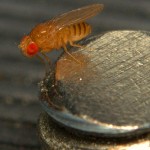I believe that research on fruit flies may be important to improving economics. And, I am not kidding.
Let me start by saying that I am aware that almost no one agrees. One academic reviewer wrote, “why would I study drosophila when I can walk down the hall and study humans?”
If you believe something that no else believes you could be a genius or a kook. Given that there are probably a million kooks for every genius, the odds are against the flies. However, I had to have some level of self-deception during the project, and I thought about examples of genius.
Genius #1: W.D. Hamilton
As a graduate student, Hamilton was interested in the genetic basis of behavior. Hamilton reports that his advisor saw a ‘eugenical spectre’ in his work. Because Hamilton was in disfavor he, unlike all other students, was never given a desk at his university nor asked to present his work.
Without a desk, Hamilton suffered. He wrote:
3 years of alienation writing, most of the time I was extremely lonely … I would go to Waterloo Station,where I continued reading or trying to write out a model sitting on the benches among waiting passengers…At times I was sure I saw something that others had not seen .. At others I felt equally certain that I must be a crank. How could it be that respected academics … would not see the interest of studying altruism along my lines unless it were true that my enterprise was bogus in some way that was obvious to them?
Hamilton assumed he would never become a professor. He writes that he was not that sad as, “I knew I was fairly good at woodwork.” Hamilton eventually got an academic job. When he asked why he had been hired, his new boss replied that he was the only applicant.
Get Evonomics in your inbox
In 1964, Hamilton published two papers, ” “The genetical evolution of social behaviour. I & II.”
These papers became among the most important scientific papers of the 20th century. One obituary described Hamilton as, “the primary theoretical innovator in modern Darwinian biology.”
Genius #2: Albert Einstein
The story of Einstein working as a patent clerk is well-known. Perhaps less known is his effort to interact with others during his early years. Einstein mailed his scientific manuscripts all around Europe to the greatest physicists of the era. Frustrated by a lack of response, Einstein began to include stamped self-addressed postcards along with his manuscripts so that he would at least know that his work had been received.
One biography of Einstein said that the Niels Bohr Institute has one of Einstein’s postcards in its collection (never returned to Einstein). I wrote the Institute to check on this claim; they were kind enough to write back saying that they have no such postcard. Whether Einstein sent the postcards or not, I imagine it capturing the spirit of Einstein’s struggle.
Genius #3: Slime mold?
Let us return the fruit flies, and, even worse, slime mold. I have argued previously that economics is a lost field. After World War II, economics became structured like physics, where the outcomes are derived from a few key assumptions (“axioms.”)
Is free trade good? Economists use math to derive an answer.
The problem is that the economic axioms do not seem to describe people. This divergence between economic theory and actual human behavior has led to the field of behavioral economics. We are roughly 50 years into the ‘behavioral’ revolution in economics and finance. However, in my view the revolution has stalled. Behavioral economists document the problems with standard economic models, but have not built a replacement theory (they, of course, disagree).
How is economics to move forward? My answer: Fruit flies. Relatively recently, natural scientists have begun doing ‘experimental evolution’. These scientists engineer environments and then study the evolutionary response of short-lived organisms including fruit flies, yeast, bacteria, and slime mold.
The appeal of experimental evolution is it allows the empirical study of the issues that currently divide economics. For example, there is an enormous debate regarding the way that humans make risky decisions. Standard economics assumes that people are robot-like optimizers who coolly weigh the odds. Behavioral economics documents the reality that this description is inadequate.
Experimental evolution allows the empirical study of risk preferences, and other economic axioms. We can build risky environments and measure the behavior that arises over evolutionary time. We conclude our paper, with this paragraph.
Economics is currently a field divided upon itself; neoclassical and behavioral economists are at odds with each other over human nature. Economic preferences are exogenous, axiomatic, and contentious. Within an experimental evolution framework, preferences can become endogenous, non-axiomatic, and harmonious.
Genius or Kook? You and history can decide.
15 December 2015
Donating = Changing Economics. And Changing the World.
Evonomics is free, it’s a labor of love, and it's an expense. We spend hundreds of hours and lots of dollars each month creating, curating, and promoting content that drives the next evolution of economics. If you're like us — if you think there’s a key leverage point here for making the world a better place — please consider donating. We’ll use your donation to deliver even more game-changing content, and to spread the word about that content to influential thinkers far and wide.
MONTHLY DONATION
$3 / month
$7 / month
$10 / month
$25 / month
You can also become a one-time patron with a single donation in any amount.
If you liked this article, you'll also like these other Evonomics articles...
BE INVOLVED
We welcome you to take part in the next evolution of economics. Sign up now to be kept in the loop!























